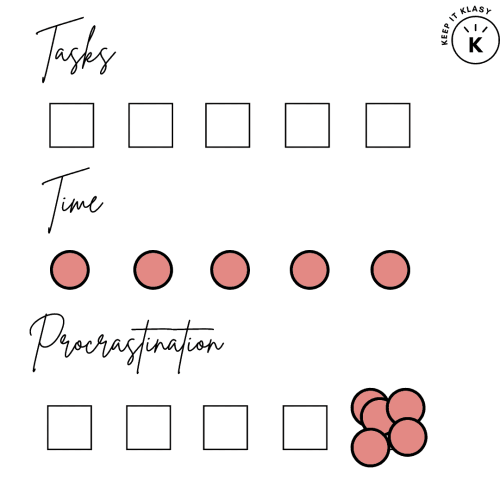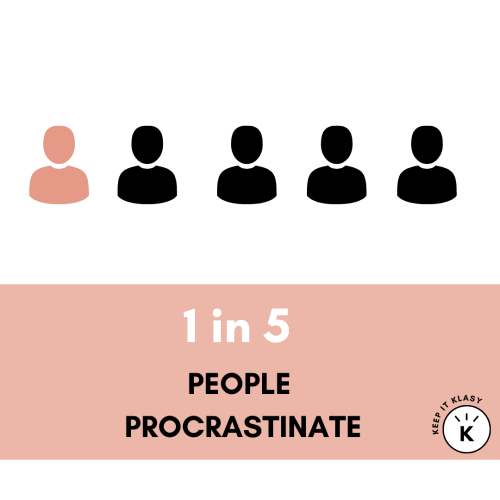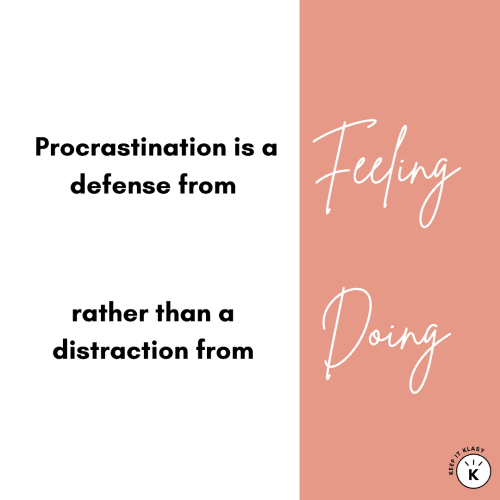
How to stop procrastinating right now? It’s always easier said than done.
I cannot imagine there is a single person that has not at some point found themselves procrastinating, however well organised or committed or responsible they are.
You know that you should be working on an important task but yet you cannot help but fritter away hours scrolling through social media or binging on Netflix. There is some resistance that seems to be stronger than you and your rational self. Hello Procrastination….
Procrastination happens to the best of us and it’s perfectly normal, but it becomes important to address it because if allowed to continue it will create a vicious cycle that will cause increasing amounts of stress and in the worst case can keep you procrastinating on your dreams.
But before we get into how to stop procrastinating it’s important to get clear on what procrastination means and what it is not?
Disclaimer: This site contains affiliate links to products. We may receive a commission for purchases made through these links. Visit my disclaimer page for more information.
What is procrastination?

Procrastination in the simplest way is the act of delaying or postponing a task or project or goal preventing you from following through on what you set out to do, putting off tasks until the last minute, or working past a deadline. Despite knowing the negative consequences
Etymologically, “procrastination” is derived from the Latin verb procrastinare — to put off until tomorrow. But it’s more than just voluntarily delaying. Procrastination is also derived from the ancient Greek word akrasia — doing something against our better judgment.
Dr. Piers Steel, a professor of motivational psychology and the author of “The Procrastination Equation: How to Stop Putting Things Off and Start Getting Stuff Done.” Says that procrastination is a form of “self-harm”.
So why do we do it, despite our better judgment?
Before looking at some of the reasons why it is important to establish what procrastination is not?
One of the main misconceptions about procrastination is that it is laziness, and this could not be further from the truth.
What is the difference between procrastination and laziness?
Procrastination is an ACTIVE process meaning that you choose to do something else instead of the most pressing task you should be doing. It means ignoring an unpleasant but important task to do an easier and more enjoyable task.
Laziness, on the other hand, means apathy or inactivity, or unwillingness to act altogether.
Procrastination can lead to feelings of shame and guilt and stop you from achieving your goals.
But before diving into how to overcome it, let’s take a look at why we procrastinate. Understanding why is always the first step because it gives you the insight you need and helps you to understand the core reason. Once you know this, you can tackle the source head-on.
Why do people procrastinate?

Seeing a task as one big project.
When you see big tasks in front of you that you know will take a lot of time, you may be prone to putting them off because the thought of getting started is so unappealing. The problem is that in a week the task will have not decreased in size but the time that you now must complete is less which leads to the next point.
Feeling overwhelmed by the task.
Yes, a big task that takes a long time will make you feel overwhelmed and so you will be less likely to get started but this is not the only reason you may feel overwhelmed by a task.
Other times it could be because the task is very stressful because you do not like the person whom you have to work with, you are not clear on the aims or you do not know how to do it.
The end result is that you are more likely to put the task off.
Having perfectionist tendencies.
Perfectionism kind of ties into the feelings of overwhelm too.
If you are a perfectionist, you may be inclined to put off tasks that you do not feel you will be able to complete in a timely manner without making the absolutely perfect. It is an unhealthy defense mechanism where you would rather not do something at all than do it and have it imperfectly done.
Lack of self-control.
Not having self-control or the ability for delayed gratification can lead to you not having the discipline to pull through difficult tasks or challenging goals.
Wanting to control everything.
At times, there will be things you have to do that you have little control over. When you are someone who is prone to wanting to have control over things, you may become so overwhelmed when you cannot, that you put the task off altogether.
Relying on pressure to finish work.
Some people rely on motivation or pressure to finish tasks. Both are counterproductive because both are not reliable. Motivation is fleeting and pressure leads to too much overwhelm meaning you are more lily to put off tasks.
Being prone to distractions.
Some of us more than others will just be prone to distractions but it does not mean we are powerless. There is always something you can do about it.
Anxiety.
General anxiety can also lead to procrastination because the underlying feeling can be that of overwhelm, fear of failure, or not completing the task to absolute perfection. The racing thoughts and ruminations that accompany anxiety can make working on a task difficult.
ADHD.
As with anxiety sometimes the reason for procrastination has a medical cause. attention deficit disorder or ADHD. ADHD is a condition characterized by persistent difficulty in maintaining attention and concentration, sometimes with a degree of impulsive or hyperactive behaviour. It typically starts to present in children.
Fear of failure.
This is one of those situations where the idea of trying something and failing is worse than the idea of not doing it at all or putting it off to avoid the uncomfortable feeling of failure. Failure can be paralysing, and the result is you putting off important projects.
Fear of negative feedback.
This is another example of a situation that in the long run is counterproductive but the fear of negative feedback, just like the fear of failure can lead you to put off a task.
Indecisiveness.
Decision paralysis? It is a thing. When you have tons of things to do, or a task requires many choices it can lead to you not making any decision at all because of the sheer overwhelm. Decision paralysis is a thing, and it leads to you delaying the tasks.
Disconnect from future self.
Living in the moment is great in many ways but sometimes, especially when you are working on something whose benefits will only be apparent in the future, you can end up procrastinating. This is usually because you are disconnected from your future self and are unable to appreciate delayed gratification.
Non-commitment.
Let’s face it, sometimes it’s because you hate the task, you no longer believe in the goal, and you are simply not feeling the passion or purpose to pursue the task.
Warning:
For some people, procrastination is more than a bad habit; it’s a sign of a serious underlying health issue. For example, ADHD, OCD, anxiety, and depression are associated with procrastination.
Also, research suggests that procrastination can be a cause of serious stress and illness. So, if you suffer from chronic or debilitating procrastination, one of these conditions could be to blame, and you should seek the advice of a trained professional.
How to stop procrastination right now and get shit done?
#1 Find your why.
By finding your why I mean to identify the reason why you might be procrastinating. Hopefully, if you’ve been through the reasons above it has become apparent. Understanding why will help you find the right tactics to help you.
#2 Recognise that you are procrastinating.
Like with any counterproductive behaviour, it is difficult to start making any changes if you are in somewhat denial about it. So recognising that what you are experiencing is procrastination can help you accept it and help you start shoeing yourself some compassion.
#3 Get rid of distractions.
Procrastination is all about learning how to control the temptation of doing something you want to be doing instead of doing the thing should be doing. If you remove the things in your environment that could be distracting you, controlling those temptations will become easier.
So put your phone away, put earplugs in if needed, and let everyone know you are in focus mode, so they do not distract you. This will make it easier for you to get into a flow state of work and stay there.
#4 Re-clarify your goals.

Having clear goals to work towards can help you beat procrastination.
If you continually find yourself putting your dreams or goals aside it could be for a number of reasons such as you are feeling overwhelmed by them, you do not believe that you can achieve them, you are being stuck on one particular task to get you there or you are losing hope.
Whatever the reason, getting a clear vision of why you are working towards this and why you started in the first place can help to get you back on track.
I love creating vision boards in Canva. It is free to sign up too unless you want to pay for extra features. I love the pro version because it gives me the flexibility to do more but until recently, I have used the free version and it will suffice.
Having a vision board can start to bring your dream and purpose to life and it can work to diminish any negative feelings and doubts you may have.
#5 Break your work into little steps.
This is a great approach for any task that is simply too overwhelming or boring.
Break it down into as small a component as you need and work on one of those components at a time. When you make a schedule or priority to-do list then write down the broken-down tasks rather than the big task itself.
If, after you have done that, you still find yourself unable to start working on that chunk, break it down even further.
#6 Tackle the hardest tasks at your peak.
We all have a time of the day that we work the best. For the early birds, it might be earlier in the day, for night owls it could be later in the day. Importantly, there will always be a few hours during the day when you are at your peak.
Identify when that time is for you and block it out in your calendar. Schedule the tasks you dread the most during that time rather than putting them off. It can help you get started and make it easier to get into a focus mode to work on them.
#7 Limit yourself to work short periods at a time.
Try not to overfill your diary and only block out small chunks of time for work before taking a break.
This can help to remove some of the resistance you have to start working on a task because let’s face it. Seeing a three-hour block that you need to spend on a task you hate, will not exactly spark motivation.
Seeing a 50 min block followed by a break will be more bearable.
#8 Plan and prioritise your tasks.
Planning and prioritising can help because it keeps you accountable. It sounds so simple but there is just something about having the task written down that makes you just get on and do it.
Depending on what suits you more, you could try doing the tasks you dread the most first or start with something lighter and more enjoyable that will get you into the flow.
#9 Give yourself a break.
Take breaks as needed, because there is a limit to how long your brain can focus on one task. Some say that you can only remain truly deeply focused 20 mins at a time before your mind needs a break. So, find your sweet time spot that works for you and remind yourself to take a short break when you are working on something that requires your focus.
Apart from short breaks between deep-focus work, try to take longer breaks and do something that will completely switch your brain off from the task such as a workout, a walk outside, or an episode of your favourite series. Whatever gets your mind off the task and allows you to rest.
#10 Increase your energy.
Everything is easier when you have the right energy levels. So make this part of the strategy. Get some daily sunshine in, eat a healthy well-balanced diet, get some movement in each day and try to get enough sleep for you per night.
#11 Figure out what you are afraid of.

Figure out what you are afraid of and reprogramme your mindset.
It could be fear of failure or the fear of negative feedback, whatever the reason do some inside work to overcome these negative feelings. Write down why you are afraid of this, why does the idea of negative feedback scare you so much, or the fear of failure? Challenge these thoughts, and try to find all the evidence that you can against these beliefs you hold about yourself.
Realise that failure is not a bad thing. Throughout our lives and especially with current schools systems we are taught that failing is a bad thing. Not getting the grades means you are not smart and cannot progress or achieve as much. We hold on to these beliefs into adulthood without realising that the same principles no longer apply.
Failure can be the best way to learn if you stop being afraid of it.
If you are afraid of failure and you are experiencing imposter syndrome have a read my post on imposter syndrome.
#12 Realise it will never be perfect.
The hard truth is that there is no such thing as perfect. And anyway, what is perfect? Perfect is so subjective and I think seeing it this way can be very liberating. Knowing that whatever you do, however well with however much effort, there will always be impressed and someone who is critical.
#13 Use self-compassion.
Self-criticism creates unnecessary stress and anxiety; it also leads to a phenomenon called ‘self-handicapping’ – a type of self-sabotage that leads to you undermining your performance in order to save your ego in case of failure. The goal is to sabotage yourself so that if you do fail, you can avoid feeling unworthy by blaming failure on a lack of trying or not having enough time.
Showing yourself some self-compassion can help you experience less performance-robbing anxiety, especially less fear of failure, allowing you to risk more and take more action.
#14 Forgive yourself for procrastinating in the past.
To stop procrastinating, forgive yourself for procrastinating, as it reduces the feelings of guilt around procrastination. Forgiving yourself for past procrastination will give you the confidence to stop putting off work in the future.
#15 Focus on the goal instead of the task.
Focus on the goals because this will provide you with far greater motivation than simply feeling like you need to get the task done. Make the goal as personal as possible and imagine exactly how your life will change if you do achieve the goal.
On the final note.
How to stop procrastinating right now and get shit done?
- Find your why.
- Recognize that you are procrastinating.
- Get rid of distractions.
- Re-clarify your goals.
- Break your work into little steps.
- Tackle the hardest tasks at your peak.
- Limit yourself to work short periods at a time.
- Plan and prioritise your tasks.
- Give yourself a break.
- Increase your energy.
- Figure out what you are afraid of.
- Realise it will never be perfect.
- Use self-compassion.
- Forgive yourself for procrastinating in the past.
- Focus on the goal instead of the task.
